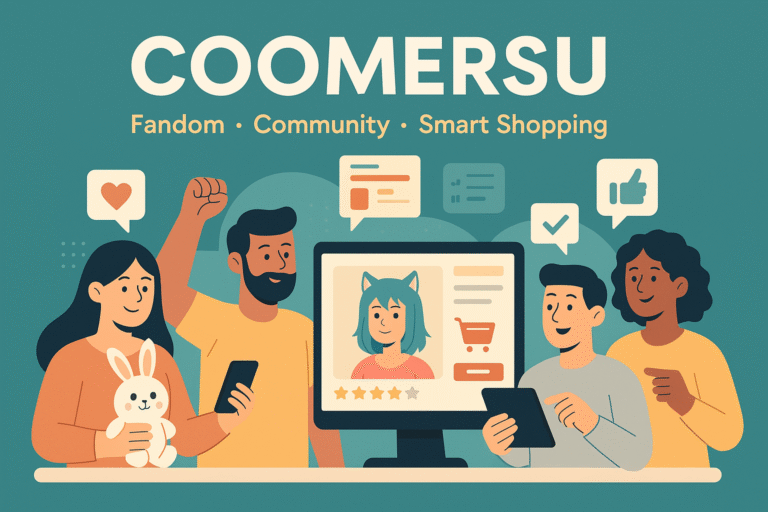If you’ve spent any time scrolling through meme pages or online forums, you’ve likely come across strange internet slang. One of the newer, meme-based subculture terms to pop up recently is “Coomersu.” While it may sound bizarre at first, the term carries a mix of humor, irony, and social commentary that reflects today’s digital culture.
The Origin of the Term
“Coomersu” is derived from the word “coomer”, an internet meme originally depicting an overly addicted online user, particularly to adult content. The “-su” ending adds a humorous exaggeration, giving the term a mock-Latin or anime-style flair often used by meme communities.
The term first began spreading across imageboards and Reddit threads in the early 2020s. It quickly evolved as a satire on obsessive behaviors — not just limited to adult material but any form of extreme online indulgence.
Understanding the Meaning of Coomersu
At its core, Coomersu describes someone deeply consumed by internet-driven desires or habits. It’s often used jokingly, poking fun at people who can’t resist digital temptation — whether that’s endless scrolling, gaming, or compulsive consumption of online fantasies.
The term blends humor with subtle critique. In other words, “Coomersu” isn’t just a meme — it’s a mirror reflecting our collective attachment to the digital world.
Coomersu vs. Coomer: What’s the Difference?
While both terms share roots, “Coomer” refers to a person fixated specifically on adult online content. “Coomersu,” on the other hand, expands this idea to include anyone excessively absorbed by online gratification — social media, fan culture, or digital obsessions.
Think of Coomersu as the “next level” of Coomer — broader, more ironic, and socially aware.
Coomersu in Internet Communities
Online communities have embraced “Coomersu” with open arms — especially on platforms like Reddit, Twitter (X), and TikTok. Memes often depict exaggerated cartoon characters embodying the lifestyle of a Coomersu — disheveled, sleepless, but humorously self-aware.
It’s not uncommon to see captions like “When you realize you’ve spent 12 hours online again — Coomersu moment.”
The Psychology Behind Coomersu
Psychologically, Coomersu represents dopamine-driven online addiction. Every like, comment, or meme hit releases small doses of pleasure, trapping users in cycles of digital reward-seeking.
This term humorously points out how easy it is to fall into that loop — a laughable yet relatable critique of internet behavior.
Coomersu as a Social Commentary
Beyond jokes, “Coomersu” serves as social satire. It comments on how people, knowingly or not, become prisoners of online impulses. It’s a collective way of saying, “We’re all in this together — and yes, it’s kind of ridiculous.”
Through memes, humor becomes both a shield and a spotlight — exposing the issue while making it easier to laugh at ourselves.
Coomersu and Modern Masculinity
Because of its roots in the “Coomer” meme, Coomersu often overlaps with discussions around masculinity and online behavior. Many see it as a humorous reflection of men grappling with isolation, online fantasy, and self-control.
However, it also invites empathy — reminding us that humor can highlight real social challenges without shaming.
Memes, Irony, and Self-Awareness
The genius of “Coomersu” lies in its ironic self-awareness. Many who use the term are poking fun at themselves. It’s a digital form of self-deprecating humor — acknowledging one’s flaws through memes instead of hiding them.
It’s the internet’s way of saying, “Yeah, I’m addicted to scrolling — but at least I know it.”
How the Term Spread Online
“Coomersu” gained traction around 2022–2023, as meme accounts on TikTok and Twitter began remixing it into viral content. Its catchy sound, absurd humor, and flexibility helped it spread across languages and cultures.
Now, it’s part of the evolving meme lexicon — proof that internet slang never stops mutating.
The Dark Side of the Coomersu Label
While usually harmless, labeling someone as “Coomersu” can cross into mockery or cyberbullying. Some online groups use it derisively, ignoring the humor behind it. Like many memes, its meaning depends heavily on context and intent.
Pop Culture References
Coomersu-themed jokes now appear in YouTube sketches, digital art, and even parody songs. Internet humor channels use it to symbolize online overindulgence — much like how “NPC” or “Sigma” memes represent other archetypes of digital behavior.
Coomersu and Digital Wellbeing
Despite its meme roots, the term indirectly raises awareness about digital wellbeing. By laughing at Coomersu behavior, people become more conscious of their habits. It’s humor with a hidden lesson: moderation matters, even online.
Why Understanding Internet Slang Matters
Internet slang like “Coomersu” reveals how language evolves alongside technology. These terms capture real cultural shifts — how we view ourselves, our habits, and our collective online identity.
Being fluent in digital slang isn’t just about memes — it’s about understanding the modern social landscape.
Conclusion
“Coomersu” might sound like just another meme, but it’s a snapshot of modern life. It shows how humor and irony help us process the chaos of online existence. Beneath the jokes lies a universal truth — we’re all, in some way, caught in the web of our own creation.
Laugh, reflect, and remember: sometimes, being a little self-aware is the healthiest meme of all.
FAQs
1. What does Coomersu mean?
Coomersu refers to someone overly consumed by online habits, usually in a humorous or self-aware way.
2. Is Coomersu a negative term?
Not necessarily. It’s often used jokingly to highlight relatable online behavior.
3. How is Coomersu different from Coomer?
Coomer focuses on adult content addiction, while Coomersu represents broader digital obsession.
4. Why did the term become popular?
It’s funny, relatable, and blends irony with internet culture — a perfect recipe for virality.
5. Should we take Coomersu seriously?
Only partly — it’s a joke with a message. Laugh at it, but also learn from it.




